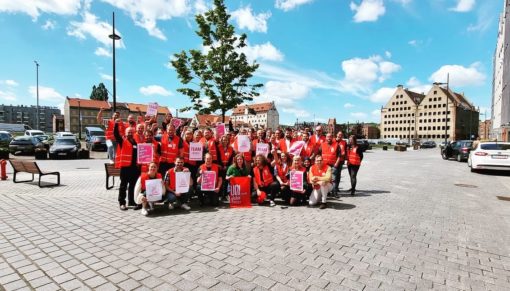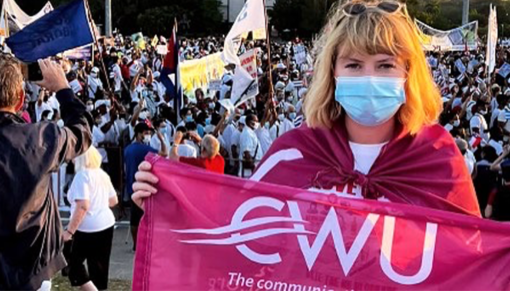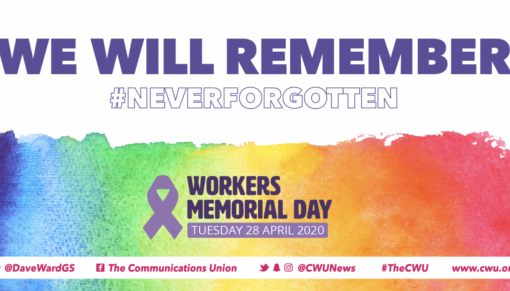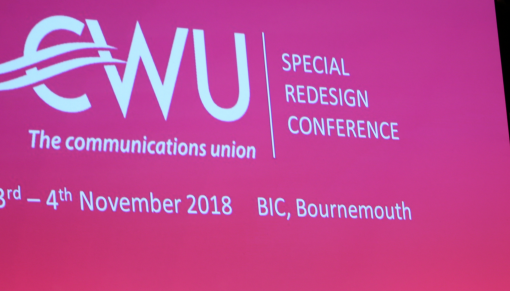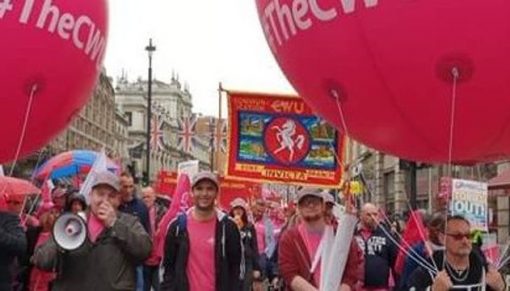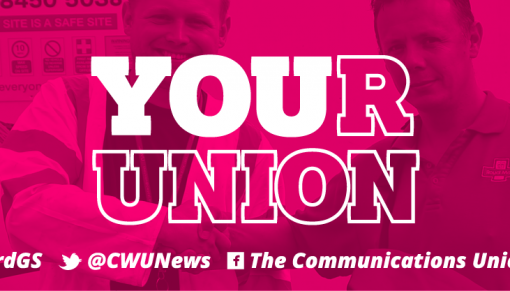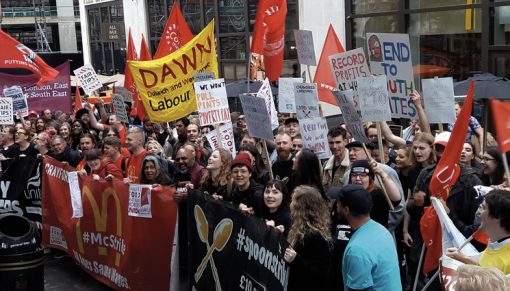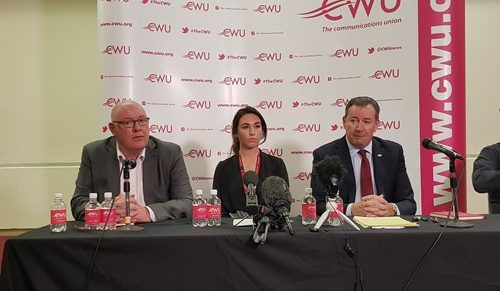Hot Strike Summer 2022 – Enough is Enough!
August 23 2022It is important that working class people understand the history of the trade union movement and the politics that underpin their industrial experience on the shopfloor. Tory governments, big bosses and managers rely on workers not knowing their working rights and their strength in numbers. Unfortunately, due to the class-based education system in the United Kingdom we are not taught about trade unions and what they do. The trade union movement must get better at educating workers, from the ground up, to oppose unfairness and to challenge the removal of protections in our workplaces.
Thankfully, the CWU is a strong industrial trade union, with structures that have been sustained over time by representatives in workplaces who have upheld our agreements. Our jobs within the Royal Mail are secure because the agreements have protected our duty structures and democratic practices on the shopfloor. Nevertheless, we are currently going through a dispute that threatens those agreements and our terms and conditions.
Simon Thompson has squeezed the institution of the Royal Mail for everything it is worth during the pandemic to generate massive amounts of profit for shareholders. We were rightfully recognised as ‘key workers’ performing a public service in our local communities and won the ‘Pathway to Change’ agreement, that promised a shorter working week and work life balance. However, Thompson has now backtracked on our agreement and is imposing ‘strings’ – aka cuts to our T&C’s. The cuts include, annualised hours, compulsory Sunday working, later delivery times and longer delivery spans, all of which are a slippery slope towards an Amazon working environment and the gig economy. He has also insulted us further by imposing a measly 2% pay rise, while he took home a bonus of £140,000, on top of his £550,000 salary.
We must take advantage of the current mood in the country due to the cost-of-living crisis and the revival of trade unions, to educate workers about our movement, to encourage them to take on rep positions and to collectively withdraw our labour, when the time comes.
History of Tory Attacks
In post-war Britain, the country enjoyed a period of consensus in which working people were provided with secure employment in traditional industries and the trade union movement was strong.
However, by the 1980s, traditional industries were threatened with ‘modernisation’ during a period of deindustrialisation and globalisation. Tory Prime Minister, Margaret Thatcher, decimated the mining industry and introduced anti-trade union laws that made it more difficult for trade unions to mobilise workers and build collectivism. Thatcher encouraged ‘individuals’ to compete with each other for labour and housing, with a dog-eat-dog mentality. Consequently, inequality has risen massively, while trade union membership has dwindled. Intergenerational inequality has also increased which means young workers are more likely to be in precarious work and are less likely to own their own home.
The Tory coalition government continued Thatcher’s work by blaming the working class for the financial crisis which was in fact caused by wealthy bankers in America. The Tories then punished us for it through the violence of austerity, in the form of welfare reforms and the privatisation of public services.
The Royal Mail was sadly privatised in 2013, however, the CWU has survived the tory attack and continues to uphold our traditional agreements on the shopfloor. Nevertheless, we have seen the inception of the gig economy within our own industry, in the form of part time contracts and the over reliance on overtime. The gig economy is a symptom of privatisation, which is a deliberate attack on secure labour for workers, to maximise profit and line the pockets of wealthy shareholders.
During the pandemic we saw the renewal of public services, including the postal service. However, we were patronised with claps from the Tories, while businesses massively profited from the global health crisis. Subsequently, we are now living through a period of austerity 2.0, known as ‘the cost-of-living crisis’, in which the Tories are allowing working people to struggle, while big bosses are cashing in. Nevertheless, this has led to a revival of the trade union movement, with more workers joining a union, looking for support in standing up to greedy employers. Railway workers have recently been out on strike with the RMT, over a dispute over pay. Similarly, Unison have also been on the picket line, fighting for the fair pay of domestic workers working for OCS, within the NHS.
Our own CEO has profited from our labour during the pandemic and is refusing to give us a pay rise, in line with the cost of living. To add insult to injury, the business wants to use the profit to dismantle our great public service and deregulate our agreements. Simon Thompson believes he can change the culture of the Royal Mail and manipulate a unionised workforce, by putting in some HR leads and disseminating faceless questionnaires. Sadly, for him, we have a strong trade union history and industrial presence on our shopfloors, like no other workplace in the country. We have the power to halt the operation at Royal Mail as manual workers and demand better terms and conditions.
This summer, we must stand together in solidarity against the Tories and big bosses, by voting for industrial action and collectively withdrawing our labour, when the time comes.
Read Grant Murray’s experience of strike action below, a fellow young worker from the RMT and Branch Secretary in the Northwest
Around 40,000 Members at Network rail and 13 train operators took 3 days of strike action on the 21st, 23rd and 25th June in a dispute centred around the employer’s inability to offer a pay rise without detrimental changes to terms and conditions, as well as their inability to offer a guarantee of no compulsory redundancies. In essence the employers backed by the DFT are looking at carving up hard fought for terms and conditions and offering a below inflation pay rise for the trouble, all this whilst workers are being squeezed by the huge increase in the cost of living.
During the three days of strike action, we received a huge amount of solidarity on our picket lines, from members of the public making donations to us, numerous visits from other trade unions coming to share messages of solidarity and many of whom pledged donations to our regional strike fund which will help us support our lowest paid members through the dispute. Also, despite the message from the Leader of the Labour Party being that front bench MP’s should not visit pickets we did have many visits from Labour Councillors as well as members of constituency labour parties in Manchester who decided that standing with workers in struggle was the right thing to do. This support and solidarity from others is always welcome and helps striking workers feel like they are part of the bigger picture.
The RMT is a militant, fighting industrial union and we have a proud tradition of standing up for ourselves, many of the terms and conditions that members enjoy today have been won through campaigns involving industrial action. This wasn’t my first time taking part in strike action, I was also involved in strike action in 2017-2018 over the role of the guard and companies proposal to introduce driver only operated trains. During that dispute we took 47 days of strike action in total over an 18-month period. Despite the company aiming to have 50% of the trains running as driver only by 2019 we still have not seen a single train run without a guard on board because of the pressure that was applied during that dispute ultimately forcing the DFT backed company to back down on their proposals. The support and solidarity we have been shown this time outweighs the support for that dispute which was also incredibly well supported.
One thing that has been really good to hear about from those visiting to show solidarity is that there is a growing number of trade unions that are either already in dispute or moving towards holding ballots of their own such as the national education union, the CWU and PCS. We have also seen huge increases in the interest in trade unions in general, an increase which is showing signs of a revival of the trade union movement which will hopefully see the working class reasserting their position using their industrial power when necessary.
Our general secretary Mick Lynch using his intricate knowledge of the industries the RMT organises in has managed to demolish the lies pedalled by the usual media pundits and poorly briefed backbench MP’s to raise the national profile of our dispute, there are countless examples of these people being embarrassed by him which has gained him an increased following and I believe contributed towards that revival of the trade union movement. And whilst there is a humorous side towards the press appearances of our general secretary, he has also managed to calmly and coherently state the case that the current system is not working to meet the needs of the working class. His message has been quite clear that members of the RMT are not special or asking for anything that is not reasonably due to them, but that exploitation is endemic in Britain’s workplaces and the only way to combat that is with a strong trade union. I am proud that as a rep and branch secretary within the RMT I can combat some of that in workplaces of the members I represent, and hopefully the national profile of this dispute will spur others on to join unions and become active within them to improve their workplaces.




















